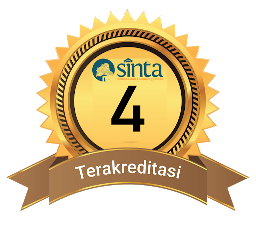Penerapan Model Problem Based Learning Terintegrasi dengan Social Emotional Learning untuk Meningkatkan Kompetensi Sosial Emosional Serta Keaktifan dan Hasil Belajar
DOI:
10.29303/cep.v6i2.5636Published:
2023-11-30Issue:
Vol. 6 No. 2 (2023): Edisi NovemberKeywords:
Problem Based Learning, Social Emotional Learning, Activeness, Learning OutcomesArticles
Downloads
How to Cite
Abstract
Penelitian ini merupakan Penelitian Tindakan Kelas yang bertujuan untuk meningkatkan keaktifan, Social Emotional Competencies (SEC), dan hasil belajar peserta didik kelas XI IPS 3 SMAN 1 Kota Bengkulu. Penelitian dilakukan dengan menerapkan model Problem Based Learning (PBL) terintegrasi dengan Social Emotional Learning (SEL). Penelitian dilakukan dalam dua siklus yang memuat langkah perencanaan, tindakan, observasi, dan refleksi. Subjek penelitian adalah peserta didik XI IPS 3 SMAN 1 Kota Bengkulu Tahun Ajaran 2022/2023. Instrumen yang digunakan adalah instrumen RPP, observasi keaktifan, angket SEC, dan post test. Hasil menunjukkan terjadi peningkatan persentase ketuntasan klasikal dari semua variabel yang diamati pada siklus I dan siklus II. Ketuntasan klasikal variabel keaktifan meningkat dari 66% menjadi 94%, SEC meningkat dari 66% menjadi 91%., dan hasil belajar meningkat dari 53% menjadi 88%. Berdasarkan hasil dapat disimpulkan bahwa penerapan model PBL terintegrasi dengan SEL dapat meningkatkan keaktifan, SEC, dan hasil belajar peserta didik XI IPS 3 SMAN 1 Kota Bengkulu.
References
Ahmed, I., Hamzah, A. B., & Abdullah, M. N. L. Y. B. (2020). Effect of social and emotional learning approach on students’ social- emotional competence. International Journal of Instruction, 13(4), 663–676. https://doi.org/10.29333/iji.2020.13441a
Ali, S. S. (2019). Problem Based Learning: A Student-Centered Approach. English Language Teaching, 12(5), 73. https://doi.org/10.5539/elt.v12n5p73
Bear, G., Yang, C., Harris, A., Mantz, L., Hearn, S., & Boyer, D. (2021). Technical Manual for the Delaware School Survey: Scales of School Climate; Bullying Victimization; Student Engagement; Positive, Punitive, and Social Emotional Learning Techniques; and Social and Emotional Competencies. Center for Disabilities Studies.
Caena, F., & Redecker, C. (2019). Aligning teacher competence frameworks to 21st century challenges: The case for the European Digital Competence Framework for Educators (Digcompedu). European Journal of Education, 54(3), 356–369. https://doi.org/10.1111/ejed.12345
Ciotto, C. M., & Gagnon, A. G. (2018). Promoting Social and Emotional Learning in Physical Education. Journal of Physical Education, Recreation and Dance, 89(4), 27–33. https://doi.org/10.1080/073030-84.2018.1430625
Constantine, M., Musingafi, C., & Muranda, K. E. (2014). Students and Questioning: A Review of the Role Played By Students Generated Questions in the Teaching and Learning Process. Studies in Social Sciences and Humanities, 1(3), 101–107.
Ee, J., Zhou, M., & Wong, I. (2014). Teachers’ Infusion of Social Emotional Learning. Journal of Teaching and Teacher Education, 2(1), 27–45. https://doi.org/10.12785/jtte/020103
Ferreira, M., Martinsone, B., & Talić, S. (2020). Promoting Sustainable Social Emotional Learning at School through Relationship-Centered Learning Environment, Teaching Methods and Formative Assessment. Journal of Teacher Education for Sustainability, 22(1), 21–36. https://doi.org/10.2478/jtes-2020-0003
Kemmis, S., & Edward-Groves, C. (2018). Understanding Education:History, Politics and Practice. Springer. http://link.springer.com/10.1007/978-94-007-6265-7
Kemmis, S., McTaggart, R., & Nixon, R. (2014). The action research planner: doing critical participatory action research. Springer Singapore. https://doi.org/10.1007/978-981-4560-67-2
Lawson, G. M., McKenzie, M. E., Becker, K. D., Selby, L., & Hoover, S. A. (2019). The Core Components of Evidence-Based Social Emotional Learning Programs. Prevention Science, 20(4), 457–467. https://doi.org/10.1007/s11121-018-0953-y
Lee, E., & Hannafin, M. J. (2016). A design framework for enhancing engagement in student-centered learning: own it, learn it, and share it. Educational Technology Research and Development, 64(4), 707–734. https://doi.org/10.1007/s11423-015-9422-5
Malmia, W., Makatita, S. H., Lisaholit, S., Azwan, A., Magfirah, I., Tinggapi, H., & Umanailo, M. C. B. (2019). Problem-based learning as an effort to improve student learning outcomes. International Journal of Scientific and Technology Research, 8(9), 1140–1143.
Mayasari, A., Arifudin, O., & Juliawati, E. (2022). Implementasi Model Problem Based Learning (Pbl) Dalam Meningkatkan Keaktifan Pembelajaran. Jurnal Tahsinia, 3(2), 167–175. https://doi.org/10.57171/jt.v3i2.335
Nafiah, Y. N., & Suyanto, W. (2014). Penerapan model problem-based learning untuk meningkatkan keterampilan berpikir kritis dan hasil belajar siswa. Jurnal Pendidikan Vokasi, 4(1), 45–53. https://doi.org/10.21831/jpv.v4i1.2540
Rujinem, R. (2023). Peningkatan Hasil Belajar Kimia Materi Larutan Penyangga dengan Metode Tutor Sebaya. Ideguru: Jurnal Karya Ilmiah Guru, 8(3), 431–437. https://doi.org/10.51169/ideguru.v8i3.453
Sukirman, S., & Solikin, M. (2020). Penerapan model pembelajaran problem based learning untuk meningkatkan keaktifan dan hasil belajar peserta didik. Jurnal Pendidikan Vokasi Otomotif, 2(2), 49–60. https://doi.org/10.21831/jpvo.v2i2.33552
Author Biographies
Hanif Nur Fadhil, Universitas Bengkulu
Dewi Handayani, Universitas Bengkulu
Puspa Darti, SMA Negeri 1 Kota Bengkulu
License
Copyright (c) 2023 Hanif Nur Fadhil, Dewi Handayani, Puspa Darti

This work is licensed under a Creative Commons Attribution-ShareAlike 4.0 International License.
Authors who publish with Chemistry Education Practice agree to the following terms:
- Authors retain copyright and grant the journal right of first publication with the work simultaneously licensed under a Creative Commons Attribution License 4.0 International License (CC-BY-SA License). This license allows authors to use all articles, data sets, graphics, and appendices in data mining applications, search engines, web sites, blogs, and other platforms by providing an appropriate reference. The journal allows the author(s) to hold the copyright without restrictions and will retain publishing rights without restrictions.
- Authors are able to enter into separate, additional contractual arrangements for the non-exclusive distribution of the journal's published version of the work (e.g., post it to an institutional repository or publish it in a book), with an acknowledgement of its initial publication in Chemistry Education Practice.
- Authors are permitted and encouraged to post their work online (e.g., in institutional repositories or on their website) prior to and during the submission process, as it can lead to productive exchanges, as well as earlier and greater citation of published work (See The Effect of Open Access).






